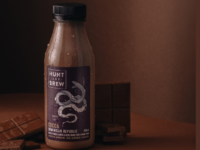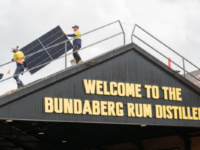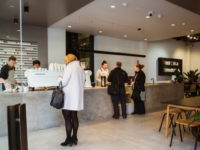 Australian businessman Dean Taylor has an affinity with start-up wine ventures, safe to say handling and building these type of companies have become his forte over the years. Inside FMCG sat down with Taylor to talk about joining Dawine.
Australian businessman Dean Taylor has an affinity with start-up wine ventures, safe to say handling and building these type of companies have become his forte over the years. Inside FMCG sat down with Taylor to talk about joining Dawine.
“I don’t know if there’s any secret behind it, but creating something from scratch is what I enjoy the most. I suspect it comes from my training and experience as an architect. The process is actually very similar but instead of building physical structures, I build businesses. It all starts with a vision which evolves through a series of design phases until it is ready to be documented and eventually built. I guess the only difference is that instead of handing the keys over to the owner, I keep the businesses and run them,” Taylor said.
On his 20-year journey in the wine industry
“To be honest, for someone who actually never set out to join the industry, I’ve had an amazing journey. My first business Wine Ark actually was born over a long lazy lunch in the Margaret River, thinking about how I could find a way to make what was becoming a relatively expensive hobby (collecting wine) tax deductable,” Taylor told Inside FMCG.
It was merely a sideline where he worked for one to two days a week but unexpectedly grew into doing something more than what he thought he would. He happened to be “in the right place at the right time” and before he knew it they had eleven climate controlled storage sites around the country, and over $100 million of wine under their management.
Meeting people and travelling to different places enticed him to stay and work in the wine industry. An opportunity that propelled him to meet people from all walks of life, full of amazing and interesting life stories.
“For some strange reason, great wine tends to grow best in the most beautiful parts of the world,” he shared.
Taylor also launched two other start-ups, which leveraged the customer database and all the data gathering. Over the two decades since he entered the wine industry, he has been involved with seven different wine businesses and his latest venture, Winedepot, is the biggest one yet.
Joining Dawine and starting Winedepot
“To roll out a network of depots both here and in China will undoubtedly require a significant amount of funding. My decision to join Dawine as CEO was largely based upon its capability as a public company to raise the funding I need to execute my vision,” shared Taylor. “In a funny way, Winedepot is a culmination of all my businesses – combining technology, storage, logistics, wholesaling and retailing together via one platform.”
Dawine is one of three publicly listed wine companies on the ASX, which has a corporate and liquor licencing structure that allows it to operate in China. But is it challenging to handle a B2B in China, considering the language barrier and tough liquor competition? He said his instincts tell him that being an Australian-owned company, it is easier to penetrate the wine sector in the Asian country.
“What we will offer the Chinese market is a unique platform that allows retail sales channels to access a massive portfolio of Australian wines, which they can either have delivered to their business outlets or drop-shipped directly to their end consumers,” explained Taylor on Dawine’s leverage in China’s liquor sector.
Revolutionising the Australian wine market overseas
He said that currently there are only 150 Australian wine brands in China and their plan is to make it easier for other 5,000 Australian producers to sell their products in the market. He told Inside FMCG that Australia’s existing wine supply chain is “inefficient, fragmented and failing to meet modern consumers expectations”. It’s vital to have a faster and cheaper delivery, wider consumer choices and to easily purchase wine by the bottle.
“In emerging markets like China it is even more fragmented, consisting mostly of traders only interested in short term transactions, rather than building long term relationships. Winedepot will use a combination of technology and strategically placed depots to make it simpler, cheaper and easier for wine producers and retailers alike to fulfill customer orders,” Taylor explained.
Smart Logistics platform
Taylor talked about the Smart Logistics platform, an interface that allows wine retailers to access a broad range of inventory from thousands of wine producers via a single integration. Liquor retailers will be able to sell directly from the producer’s inventory holdings and forward their orders to be drop-shipped directly to the end consumers.
“[Not] only does it dramatically reduce delivery costs and shipping times, but also simplifies administration and increases sales opportunities for wine producers,” he explained.
So what does the future of the wine industry look like?
Taylor said that over the last decade, there has been a “global glut of wine” with supply which has vastly affected the demand, but the rapidly expanding middle class in China has changed the imbalance. Taylor said in 2017, there were more than $1.1 billion of Australian wine sold into China, wherein over 50 per cent were sold compared to the year before that.
“What is really scary about that number is that imported wine, from every country and not just Australia, represents just 1 per cent of the liquor sold in China. What we are witnessing is just the start of a major shift in the global wine industry where China becomes the centre of the universe. With the recent changes to the trade tariffs, Australia has been placed in poll position to capitalise on this emerging opportunity. It’s why I see such a big future ahead for Dawine and Winedepot,” explained Taylor.
“However it is most definitely going to have an impact on prices as the global demand exceeds supply. My advice is to stock up while you can because the days of getting great Australian wine at 50 – 60 per cent off the RRP won’t last for much longer.”
















